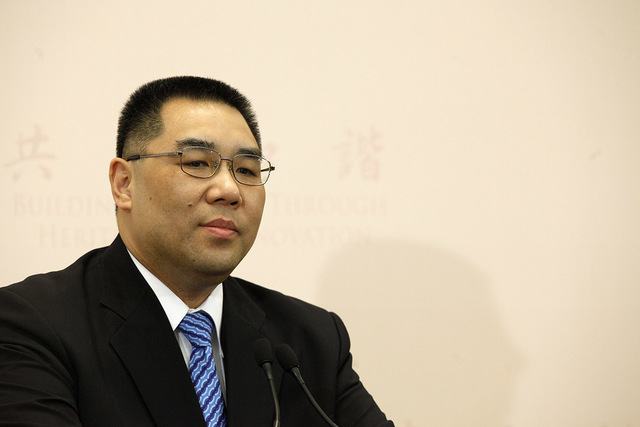Macau top official’s speech not the message Las Vegas wanted to hear

A policy address by Macau’s top government official this week wasn’t an uplifting and positive message the casino industry and the investment community were hoping to hear.
Macau Chief Executive Fernando Chui told lawmakers on Monday the Special Administrative Region had entered an “adjustment” period of slower and stable growth. Chui, who has been region’s chief executive since 2009, vowed to toughen regulation on the gaming industry when casino license renewals start taking place in the next few years.
The review will look at how the six gaming license holders — including Las Vegas Sands Corp., Wynn Resorts Ltd. and MGM Resorts International — have conducted business since Stanley Ho’s Macau casino monopoly ended in 2002.
The government wants to review the development of nongaming attractions, the creation of jobs, and the promotion of Macau residents within each company.
“The government will strive to adjust the pace without changing the momentum, seeking stable growth amid adjustments,” Chui said during the talk, his first policy address since being appointed to a second term.
Also, Macau’s tourism panel, under the chief executive’s direction, will draft a five-year plan for stable casino growth that will make the region less reliant on casino revenue. Macau, Chui said, will become a center of tourism and leisure travel.
The wide-open development days have ended. They began shortly after Macau was returned to China in December 1999 after 442 years as a Portuguese colony.
“Mr. Chui’s speech was in-line with our expectations,” Deutsche Bank gaming analyst Andrew Zarnett told investors.
Wells Fargo Securities gaming analyst Cameron McKnight said Macau wants tighter gaming regulatory policy and more moderate growth.
“The government will increase supervision of the gaming industry,” McKnight said. “The policy review will be comprehensive.”
The steps addressed by Chui had a familiar ring. China President Xi Jinping wants Macau to be more than just gambling. His visit to Macau in December to celebrate 15 years since the Portuguese handover signified that effort.
Last year, the president began a crackdown on corruption in China that focused on junket operators who filled Macau casinos’ high-end baccarat players. Coupled with a slowing national economy, big spending gamblers and middle-market customers curtailed their trips to Macau.
Gaming revenue has declined nine straight months — a 10th straight drop is all but assured in March. The Macau economy economy shrank 17 percent over the last three months of 2014. Gaming revenue dipped 2.6 percent in 2014 to $44.1 billion, the first time since the market was opened that Macau experienced an year-over-year decline.
Macau regulators now expect gaming revenue to decline almost 32 percent when 2015 is in the books, a stunning fall from 2013’s single-year record of $45.2 billion.
Macau has entered a new normal.
Chui said the review of license holders was just the beginning.
Next year, Macau will impose a full ban on smoking inside all public areas, including casinos. Analysts believe last fall’s partial casino smoking ban contributed to the revenue decline. Currently, smoking is banned on mass market floors, but permitted in VIP areas. The full ban could add to the high-end revenue woes.
Meanwhile, Chui said there is a “need to improve and adjust” the issuance of visas to individual travelers from Mainland China. Basically, Macau is overcrowded with visitors. The chief executive wants the visa policy to strike a balance between tourism and the quality of life for Macau citizens.
The change in direction comes as Wynn, Las Vegas Sands, and MGM Resorts move forward on multibillion hotel-casino projects in Macau’s Cotai Strip region that are expected to open in 2016. Executives from the companies have pointed out the nongaming elements the resorts are bringing to the market.
The $4 billion Wynn Palace, for example, will have outdoor gardens, an aerial transport system with gondolas and a performance lake. Las Vegas Sands’ $2.7 billion Parisian will have a half-scale Eiffel Tower.
Zarnett believes the current downturn in the Macau casino market is cyclical.
“As such, our confidence in the secular growth story of Macau gaming remains intact,” he said.
Chui is Macau’s second-ever chief executive. The position is akin to being a governor, but the job also serves a buffer between Macau and Beijing.
Chui was born in Macau and educated in the United States. His undergraduate degree is from Sacramento State and he has a doctorate from Oklahoma State University.
After taking over from Edmund Ho, gaming industry leaders were hopeful Chui would expand the market and increase the number of gaming license holders. In his initial policy address in 2010, he eschewed that idea.
Now, with his second term underway, Macau’s chief executive has made his intentions clear. Gaming is an amenity in Macau, not the primary attraction.
Howard Stutz’s Inside Gaming column appears Wednesdays and Sundays. He can be reached at hstutz@reviewjournal.com or 702-477-3871. Find on Twitter: @howardstutz.